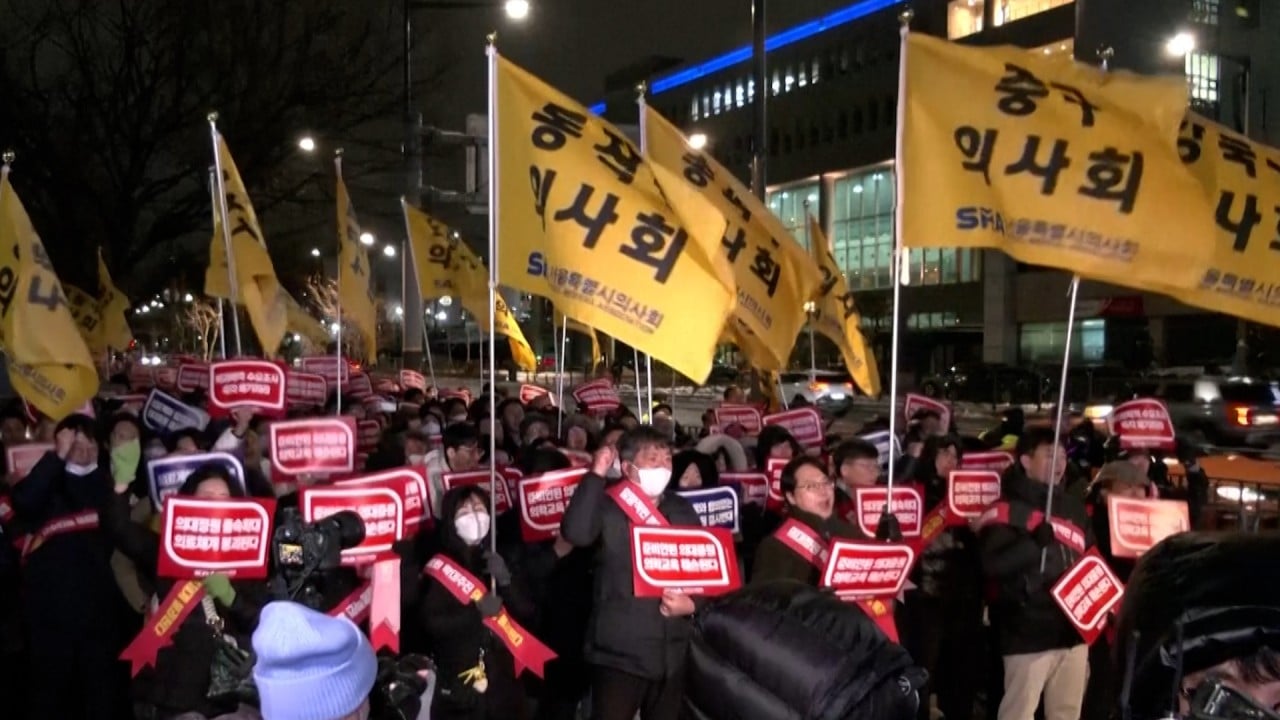
Will Seoul address ‘thorny’ issue of healthcare reform as doctors protest for higher wages, lawsuit protection?
- Low wages for doctors in the public sector and growing threats of lawsuits from patients have pushed doctors to more lucrative but low-risk specialities
- Ahead of April elections, President Yoon Suk-yeol vowed not to back down and threatened to suspend licences and jail those defying orders to return to work
Low wages for doctors in the public sector and growing threats of lawsuits from patients have pushed some doctors to switch to more lucrative but low-risk specialities such as dermatology and plastic surgery, resulting in understaffed vital public sector services.
“No politician has attempted to address these thorny issues including distorted payments under the healthcare system and protection of doctors from damage suits, kicking the can down the road,” Choi Jin, head of the Seoul-based Institute of Presidential Leadership, told This Week in Asia.
He pointed out that such measures, which would require taxpayers’ dollars, would be unpopular.

Medical students across universities have also taken a leave of absence en masse in solidarity. About 65 per cent of the country’s 19,000 students skipped classes at 37 out of 40 medical schools nationwide as of Monday.
The strikes and absences began after the government earlier this month announced a significant increase in the annual intake of medical students, from 3,000 to 5,000, hoping that higher admission quotas would ease doctor shortages in rural areas and essential medical fields including high-risk surgeries, paediatrics, obstetrics and emergency medicine.
Doctors said the government should focus on raising income levels for those working in vital departments, who receive low wages amid tough working conditions and face the crippling cost of malpractice suits by patients.
Trainee doctors at major hospitals in South Korea typically receive some 3.5 million won a month (US$2,600), about the average monthly wage for company workers. The country’s major hospitals rely heavily on such trainee doctors, who typically work some 80 hours a week.
President Yoon Suk-yeol vowed not to back down, speaking against collective actions at a cabinet meeting earlier this month.
The government is also planning to investigate the damage caused to the healthcare system by the walkout by thousands of trainee doctors. Yoon’s administration has given doctors until Thursday to end their walkout without facing reprisals.
The government has threatened to suspend licences, arrest and pursue criminal charges against medical personnel and jail those defying orders to return to work.

Korean Medical Association spokesman Joo Soo-ho warned of medical “chaos” should the government “hurt” trainee doctors or medical students on strike.
The strikes have also divided public opinion, with strike participants seen playing into the hands of Yoon’s ruling conservative party in the lead-up to the elections amid media portrayals of their unwillingness to work as a sign of greed.
“We are disheartened by [the government and media’s] portrayal of doctors being driven solely by greed,” said Hwang Gyu-suk, vice-president of the Seoul Medical Association.
Hwang added that his son, a fourth-year medical student, told him he was so hurt by public discourse and the perception of doctors that he did not want to work in the country.
Observers said the issue has been a political boost for the ruling party for parliamentary elections in April, with eight out of 10 people opposing the doctors’ strike, according to opinion polls.
“This strike has grabbed all news headlines, burying other issues such as economic difficulties and other policy failures, helping rally support for the ruling conservatives ahead of the crucial parliamentary elections,” said Jung Suk-koo, former executive editor of Hankyoreh daily.
South Korea’s Yoon must convince voters that pivot to US won’t hurt economy
South Korea, Japan and other countries place quotas on medical school seats in a way to regulate the number of doctors. While Japan, which faces a similar demographic challenge as its neighbour, has raised its quota in recent years, Yoon’s government said South Korea has not increased the number of slots at medical schools for nearly three decades.
Critics of the walkout contend the labour action may be more about protecting the earning power of doctors rather than improving the quality of the South Korean healthcare system.
Medical personnel strikes are not uncommon in South Korea.
Doctors in 2000 went on strike for several weeks, protesting against a heath reform that prohibited them from selling medicine and gave that authorisation to pharmacists instead.
After a doctors’ strike in 2014, the government scrapped a plan to introduce telemedicine for remote areas. In 2020, the government backed down from a plan to expand admissions to medical schools after doctors went on strike during the Covid-19 pandemic.
Additional reporting by Bloomberg



